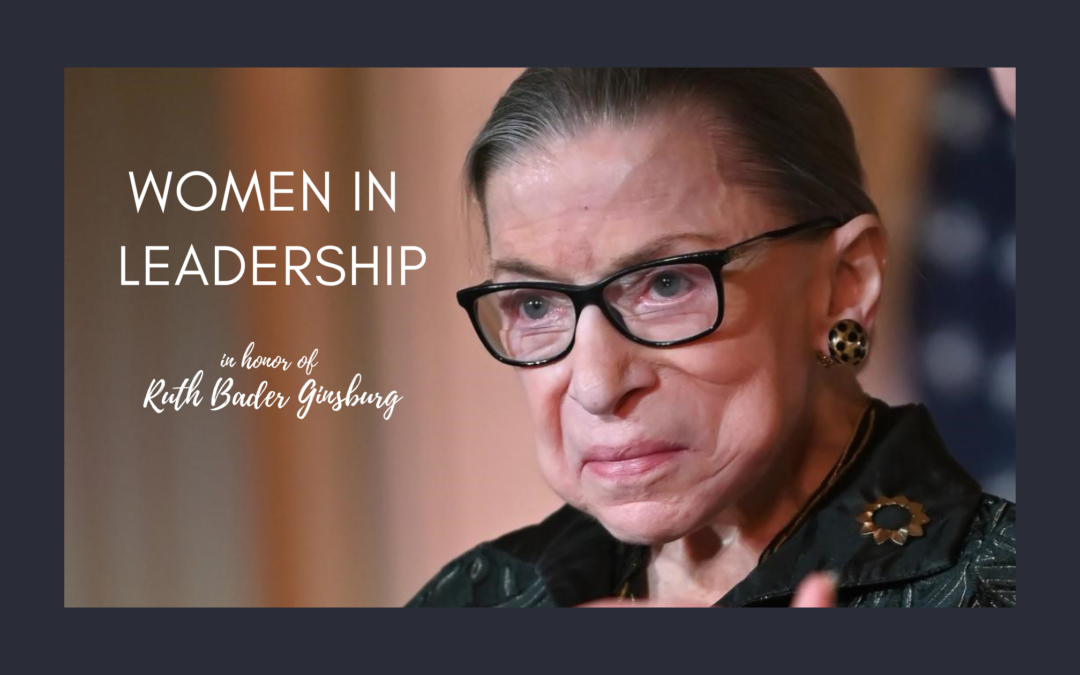Supreme Court Justice Ruth Bader Ginsburg’s fight for equality has had an enormous impact on this country, and we owe her our deepest gratitude for her life’s work.
Given my age, I’m both too young to have experienced the level of systemic sexism that women in her generation experienced and old enough to have experienced blatant sexism that appalled and angered me. Looking back, there are certain experiences that are seared in my memory. They serve as reminders about lingering sexism and have spurred me to do my part to address them.
While my K-12 experience did not seem overtly marred with sexist attitudes (or perhaps I didn’t recognize it), those attitudes were clearly present when I became a military wife in the early 1980s. After marrying an Air Force Officer, I was told that I should be grateful that there were recent changes in the military that no longer allowed an Officer’s Evaluation Report to include how his wife’s activities contributed to his career. (Thank goodness for that since it was clear that I was much more of a liability than asset!) Similarly, my fellow military wives mentioned that it was inappropriate for me to earn my master’s degree before my husband had earned his graduate degree. Stunning!
During my doctoral work, one of my areas of research was the women’s suffrage movement in this country. We discussed the numerous social movements of the 1800s and early 1900s and how they were intertwined and connected as many activists fought together to achieve equality for all. Yet when I would share this powerful history with my students and talked about the ongoing struggle for equality, I was often told that women had achieved parity with men.
When I was writing my dissertation, we moved to Colorado and my husband had left the military life behind. Once here in Colorado, I began to worry about my children’s K-12 experience. I was concerned about lacking academic rigor. So, my dear friend and I decided to submit a charter application. This was the early days of the Colorado charter school movement, so districts were not always excited about new charter applications. During the charter application review process, one of the Assistant Superintendents looked at the two of us and said, “Girls, why don’t you go home and try again next year?” Once again, I was stunned! Did he just call us “girls”?
Fast forward 20 years and I found myself testifying at the State Capitol on proposed charter legislation. By this time, I was leading the Colorado Charter School Institute, had been in charter school leadership positions for many years, and had earned my Ph.D. a long time ago. As superintendents were called one by one to testify, the men went first. The Chair of the Committee assumed every male superintendent had a doctorate and addressed each one with that title. One of them had to correct her and explain that he did not have a doctorate. Then came me – lo and behold, I was not addressed with that title. My staff were stunned! I assumed that the Chair of the Committee (a woman) did not intend to be insulting, rather she did not err on the side of using the title.
This subtle and implicit bias against women persists to this day.
The reality is that women are still in this fight even if we think we have reached equality. The numbers speak for themselves: there are more women than men earning college degrees and graduate degrees, yet women continue to earn less and are less likely to hold leadership positions. As educators, we lament and worry about the lack of performance and engagement of our boys and young men. This is a serious concern that all of us need to address. And, we also need to be aware that despite the great academic success of women in this country, women are still shut out of the upper echelon of leadership positions in all fields, accounting for 55% of undergraduates, but holding only 4% of leadership positions in Fortune 500 companies.
When I contemplate the life’s work of Justice Ruth Bader Ginsburg, I am overwhelmed by what she accomplished, her unyielding drive for equality, and the powerful legacy she leaves behind. Although I have experienced hurdles and obstacles based on my gender, I know that I have been the beneficiary of her fight and the fight of all the other women that have gone before me. While I may not be forging a brand new path, I hope that I am widening the road for those who come behind me.

